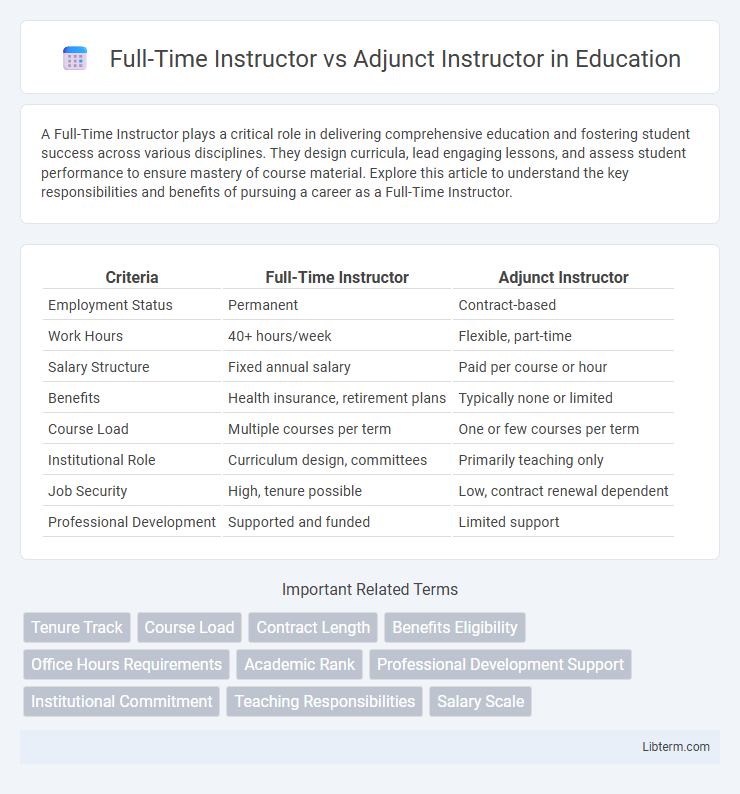A Full-Time Instructor plays a critical role in delivering comprehensive education and fostering student success across various disciplines. They design curricula, lead engaging lessons, and assess student performance to ensure mastery of course material. Explore this article to understand the key responsibilities and benefits of pursuing a career as a Full-Time Instructor.
Table of Comparison
| Criteria | Full-Time Instructor | Adjunct Instructor |
|---|---|---|
| Employment Status | Permanent | Contract-based |
| Work Hours | 40+ hours/week | Flexible, part-time |
| Salary Structure | Fixed annual salary | Paid per course or hour |
| Benefits | Health insurance, retirement plans | Typically none or limited |
| Course Load | Multiple courses per term | One or few courses per term |
| Institutional Role | Curriculum design, committees | Primarily teaching only |
| Job Security | High, tenure possible | Low, contract renewal dependent |
| Professional Development | Supported and funded | Limited support |
Understanding Full-Time and Adjunct Instructor Roles
Full-time instructors typically hold permanent positions with comprehensive responsibilities including curriculum development, student advising, and participation in departmental governance, ensuring consistent academic quality and student support. Adjunct instructors are hired on a contractual basis, often part-time, focusing primarily on teaching specific courses without long-term commitments or extensive administrative duties. Understanding these distinctions highlights the varying levels of institutional involvement, job security, and workload expectations between full-time and adjunct faculty roles.
Job Responsibilities: Full-Time vs Adjunct
Full-time instructors are responsible for developing comprehensive course curricula, conducting in-depth lectures, advising students, and participating in departmental meetings and committees, ensuring a consistent educational experience. Adjunct instructors primarily focus on delivering specific course content and grading, with limited involvement in curriculum development or institutional governance. Full-time roles often require commitment to research and service activities, while adjunct positions are more contract-based with fewer responsibilities beyond classroom instruction.
Employment Stability and Security
Full-time instructors typically enjoy greater employment stability and security due to long-term contracts, benefits, and institutional support, whereas adjunct instructors often face precarious, short-term contracts without guaranteed renewal or consistent income. Full-time roles include access to tenure tracks, health insurance, retirement plans, and paid leave, significantly enhancing job security. Adjunct positions, however, are frequently contingent on enrollment numbers and budgetary constraints, leading to limited job protection and fewer employee benefits.
Benefits and Compensation Comparison
Full-time instructors typically receive comprehensive benefits packages including health insurance, retirement plans, paid leave, and job security, while adjunct instructors often lack these benefits and work on a part-time, contract basis. Compensation for full-time instructors is generally higher with a stable salary, whereas adjuncts are paid per course or credit hour, resulting in lower overall earnings and less financial stability. Institutions often invest more in professional development and career advancement opportunities for full-time faculty compared to adjunct positions.
Teaching Load and Work-Life Balance
Full-time instructors typically manage a heavier teaching load, often handling multiple courses per semester and engaging in departmental responsibilities, which can challenge work-life balance. Adjunct instructors generally have lighter teaching loads, allowing for greater flexibility but often face income instability and limited access to professional development. Balancing these factors, full-time roles offer consistency and benefits, while adjunct positions provide more scheduling freedom at the expense of job security.
Professional Development Opportunities
Full-time instructors typically have greater access to professional development opportunities, including funded workshops, conferences, and training programs, which support career advancement and skill enhancement. Adjunct instructors often face limited access to these resources due to part-time status and institutional budget constraints, which impacts their ability to engage in continuous professional growth. Institutions increasingly recognize the importance of extending professional development benefits to adjunct faculty to foster instructional quality and equity.
Impact on Student Success
Full-time instructors contribute significantly to student success through continuous engagement, consistent availability, and deep integration into academic development, fostering stronger mentorship and comprehensive curriculum feedback. Adjunct instructors often bring specialized industry experience and flexible scheduling, yet their limited interaction time with students and less involvement in institutional activities may reduce long-term academic support. Institutions prioritizing full-time faculty tend to report higher student retention and graduation rates due to sustained instructional quality and robust support systems.
Career Advancement Prospects
Full-time instructors typically have greater career advancement prospects due to stable employment, access to professional development resources, and opportunities for tenure or promotion within academic institutions. Adjunct instructors often face limited advancement potential because of part-time status, lack of job security, and fewer institutional benefits. Universities prioritize full-time faculty for leadership roles, research funding, and curriculum development, enhancing long-term career growth opportunities.
Institutional Expectations and Support
Full-time instructors receive comprehensive institutional support, including access to professional development, research funding, and participation in curriculum planning, reflecting higher expectations for teaching, service, and scholarship. Adjunct instructors typically have limited access to such resources and are primarily expected to focus on delivering assigned courses without extensive involvement in institutional governance or research activities. Institutions often prioritize full-time faculty for tenure-track positions, granting them job security and a voice in academic decision-making, whereas adjunct roles are usually contract-based with minimal institutional investment.
Choosing the Right Path: Factors to Consider
Choosing between a full-time instructor and an adjunct instructor position involves evaluating job stability, benefits, and workload. Full-time instructors typically receive comprehensive health benefits, retirement plans, and a consistent salary, making them suitable for those seeking long-term career growth. Adjunct instructors offer flexibility and diverse teaching opportunities but often lack job security and benefits, so individuals prioritizing work-life balance and varied schedules may prefer this path.
Full-Time Instructor Infographic

 libterm.com
libterm.com